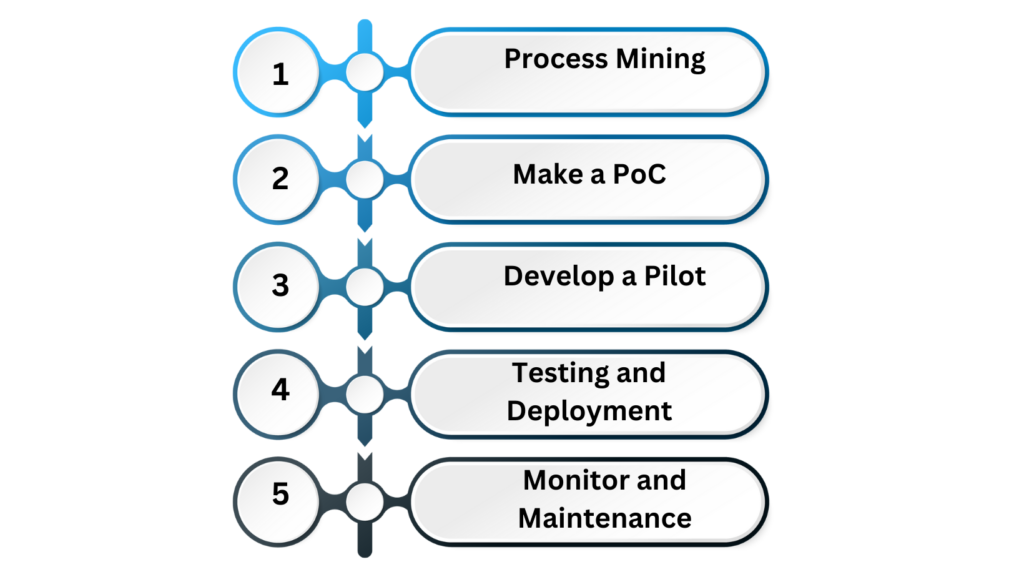Use Cases of Robotic Process Automation Across Industries
RPA boasts widespread applicability, and its implementation for process automation does not demand substantial investments or additional installations, granted its effective utilization.
Human Resource
RPA plays a pivotal role in streamlining and revolutionizing numerous HR processes. Notable applications of RPA in this domain encompass activities such as employee onboarding and offboarding, resume shortlisting, candidate screening, document collection and validation, interview scheduling, attendance and payroll management, and the updating of HR dashboards, among others.
The extensive applications of robotic process automation tools empower human resource professionals to effectively recruit top talents, alleviate administrative burdens, enhance employee experiences, and concentrate on implementing strategic HR initiatives. Within UiPath, the HR team utilizes RPA tools specifically for automating employees’ onboarding and offboarding processes.
Healthcare
Robotic process automation finds extensive applications throughout the healthcare industry, enhancing patient care and revolutionizing operations. Prominent healthcare institutions, including major hospitals such as the NHS, leverage RPA to enhance patient care and automate critical processes such as patient registration, appointment scheduling, information management, insurance verification, claims processing, prescription and account management, among others. These instances underscore the significant potential of automation in transforming healthcare practices.
e-Commerce
This integration is crucial for streamlining operations, identifying fraud, automating laborious processes, and enhancing the overall customer experience. Warehouse management, customer relationship management, fraud detection bring substantial benefits.
Customer Support
RPA holds a crucial role in elevating customer service by automating rule-based and repetitive tasks, ultimately contributing to streamlined operations and increased efficiency. Routine activities such as data entry, handling common queries, generating automated responses, document uploads, e-signature verification, customer information transaction processing.
Invoice Processing
Creating invoices is a pivotal yet daunting task for any organization when executed manually. Managing a stack of files, emails, transaction attachments, etc., regularly demands significant time, effort, and resources. Additionally, manually performing these repetitive tasks increases the likelihood of errors. An RPA bot can swiftly and effectively analyze a substantial volume of files, extracting and organizing data seamlessly without human intervention.
In summary, optimal robotic process automation processes are characterized by being rule-based, repetitive, susceptible to human error, and involving high volumes of tasks.
Benefits of Robotic Process Automation
Integrating robotic process automation into business operations provides a myriad of advantages for organizations across various sectors. By automating tasks, it brings about a transformative impact on their functioning. Here are some notable benefits associated with the implementation of robotic process automation in businesses.
Increase Operational Efficiency
In the fiercely competitive market, organizations find it challenging to thrive without harnessing the power of software bots for operational automation. Effectively deploying RPA bots can lead to time, cost, and resource savings, streamlining processes and enhancing overall operational efficiency.
Boost Employee Productivity
By delegating mundane tasks to RPA, employees can utilize their available time to concentrate on more critical responsibilities that require human involvement. This results in heightened productivity and fosters a more positive and content work environment.
Enhance Customer Satisfaction
This not only improves various processes but also contributes to enhanced customer service, strengthening relationships, increasing retention rates, bolstering credibility, and ultimately elevating overall customer satisfaction.
Improve Accuracy and Compliance
RPA bots excel in executing intricate processes with heightened precision, thereby reducing human errors, especially in tasks demanding accuracy and compliance. By strictly adhering to predefined rules and regulatory standards, RPA guarantees that all tasks are carried out following industry compliance norms.
Reduce Time to Market
Due to the simplicity of implementation without the need for intricate coding, robotic process automation solutions can be quickly deployed into your IT system. This enables businesses to promptly respond to market demands and cultivate a competitive edge.
Automating Business Processes to Achieve Excellence – Real-World Examples
Numerous industry leaders have embraced the power of robotic process automation to streamline their operations and revolutionize business processes. Let’s explore a few of these giants who exhibit remarkable agility in leveraging the potential of robotic process automation.
Walmart
Walmart, an unquestionable retail powerhouse, employs numerous bots to automate its operations and enhance customer satisfaction. Tasks such as responding to inquiries, tracking inventory flow, and extracting information from audit papers have seen significant improvements through the implementation of RPA. By harnessing the complete potential of RPA, Walmart effectively handles intricate processes, thereby aiding its workforce and elevating the overall customer experience.
AT&T
AT&T encountered unique challenges while transitioning to remote work culture, with a particularly formidable obstacle arising in the realm of phone payments due to US laws restricting access to sensitive customer data by businesses. To surmount this hurdle, AT&T harnessed the capabilities of low-code robotic process automation, guaranteeing the secure processing of payments while upholding customer privacy. Consequently, 40,000 AT&T employees were able to seamlessly work remotely without experiencing any disruptions in the workflow.
American Express Global Business Travel
American Express Global Business Travel, a multinational travel management company, employs robotic process automation to streamline the tedious procedure of canceling airline tickets and issuing refunds.
Bank of America
Bank of America, a prominent financial institution, has effectively deployed over 22 software bots spanning its back, middle, and front offices to enhance customer support. The extensive integration of robotic process automation at BAC has resulted in decreased risks, increased productivity, and substantial cost savings. BAC serves as a notable exemplar of how trends in robotic process automation can deliver remarkable outcomes within the banking and finance sector.
RPA Implementation: Challenges and Solutions
The advantages of robotic process automation are boundless, positioning it as a crucial implementation for businesses to maintain competitiveness in the digital landscape. However, similar to any other technology, RPA comes with its set of challenges, risks, and limitations in the course of successful implementation.
- A prevalent challenge encountered by businesses during the effective implementation of robotic process automation is the identification of suitable processes for automation. Selecting an inappropriate process for automation can result in inefficiencies.
- The concern over software bots replacing human labor poses a noteworthy limitation in the acceptance of software robots and the implementation of RPA by companies. Although it’s acknowledged that RPA can diminish the necessity for human involvement in numerous processes, it’s crucial to recognize that these bots also rely on humans for updates and reprogramming.
- Primary challenges, including the integration of RPA with existing legacy systems, security concerns, and scalability issues, genuinely stand as significant obstacles for organizations, hindering their adoption of robotic process automation trends.
- A notable impediment frequently faced by companies on their enterprise robotic process automation journey is the establishment of corporate support. Robotic automation often struggles to garner robust backing across various departments, and the absence of overall support can result in conflicts concerning individual beliefs, responsibilities, and control.
How Digiatto IT Services Helps You Automate Your Business Processes
If you’ve made it this far in the article, it’s apparent that robotic process automation is indispensable for businesses of all sizes across industries globally. Consequently, any organization aspiring to leverage the complete potential of RPA bots and secure a competitive edge should collaborate with a reputable IT Company such as Digiatto IT Services. Such partnerships can guide you through the crucial steps of successful RPA implementation.
Steps for a Successful RPA Implementation

Process Mining
In any industry, initiating the RPA journey begins with process mining, as strategic planning to enhance operational efficiency is pivotal for large-scale transformation. To kickstart your automation journey, our team of automation engineers will conduct process mining to pinpoint the crucial processes that require automation.
Make a PoC
After pinpointing the automation area and consulting with you, the subsequent step involves developing a Proof of Concept (PoC). The PoC stands as a crucial milestone in the RPA journey, as inadequate execution can result in both time and financial resources being squandered.
The PoC serves to test the feasibility and effectiveness of robotic process automation tools within the business environment. When creating a PoC, our primary emphasis lies in automating critical processes rather than attempting to automate entire operations at once. This approach allows us to assess whether the automation efforts yield the anticipated outcomes.
Develop a Pilot
Following the successful demonstration of the PoC, the next phase involves running a pilot program to automate specific aspects of your business, essentially testing the waters.
Testing and Deployment
Before integrating software bots into your company’s system, a comprehensive testing process must be undertaken. If the software bots operate as intended during the testing phase, they will then be seamlessly integrated into your company’s digital ecosystem
Monitor and Maintenance
The RPA journey extends beyond deployment. We commit to continuously monitor and update your robotic process automation endeavors to guarantee optimal efficiency across various processes.
The Future of Robotic Process Automation
It’s essential to shift the perspective on robotic process automation technology from being viewed merely as a current tool for process automation and cost reduction. Instead, recognize it as the cornerstone for shaping the modern business of the future. The forthcoming evolution of RPA lies in hyper-automation and intelligent automation (IA), presenting a realm of new opportunities for automation across a diverse array of businesses spanning various industries.
According to the HFS report, there is a notable shift in businesses’ perspective, moving away from considering robotic automation solely as a cost-saving tool.


